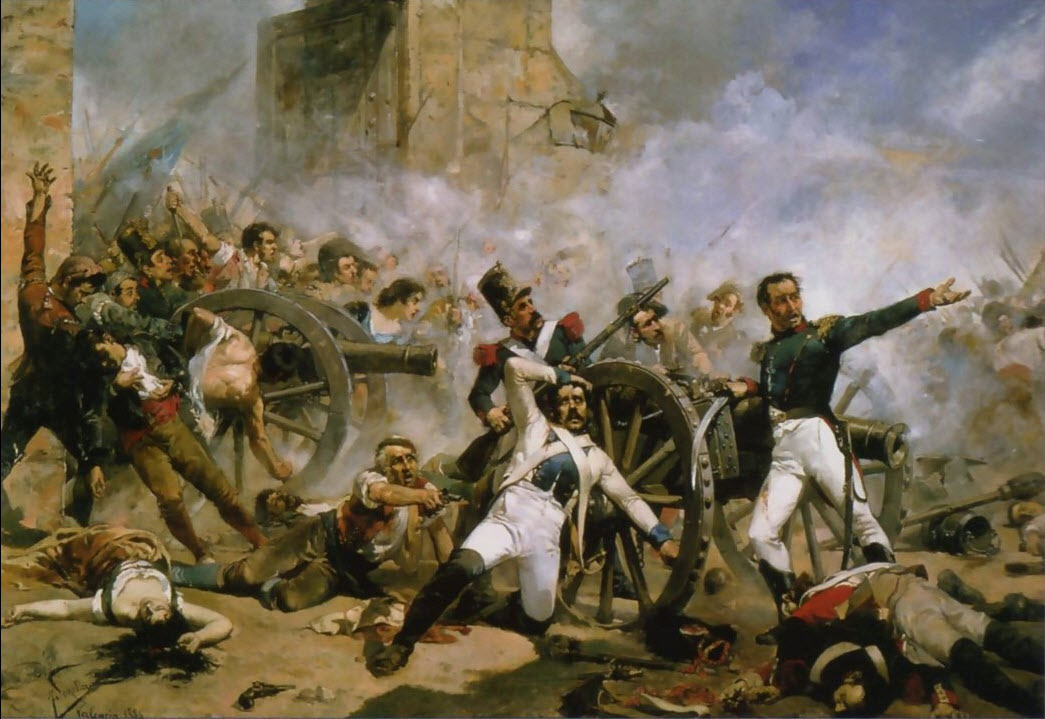The Peninsular Campaign
The Duke of Wellington Crosses Swords With Napoleon and His GeneralsPENINSULAR WAR, (also known as the Peninsular Campaign) is the name generally applied to a war waged by the French Empire under Napoleon and British forces, supported by Spanish insurgents as well as remnants of the Portuguese army for control of Spain and Portugal between 1807 and 1814. It is referred to as the Peninsular War because fighting took place throughout the geographic area known as the Iberian Peninsula.
Spain had been a major ally of France, but a disagreement between Charles IV., King of Spain, and his son Ferdinand, in 1807, gave Napoleon to pretext to interfere in Spanish affairs. Accordingly he placed his brother Joseph on the throne of Spain, who was proclaimed king on July 24, 1808. He also attempted to seize Portugal in order to enforce the Continental System of blockade against Britain, since Portugal refused to join in the embargo.

Napoleon's Intervention in Spain Leads to A Costly Guerilla War for the French
The royal family of Portugal had previously fled to Brazil, but the people of both Portugal and Spain rose against the French in all parts of the peninsula. Napoleon had stationed French troops at many strategic points and the people at first carried on a guerrilla warfare, but on July 12, 1808, a British army of 30,000 men was sent under Sir Arthur Wellesley, later known as the Duke of Wellington< to aid in expelling the French.
He landed at Figueras, Portugal, and on Aug. 21 defeated the French under General Junot at Vimeiro. Wellington was superseded in the command by Sir Harry Burrard, who soon after was superseded by Sir H. Dalrymple, and the latter on Aug. 30 concluded the Treaty of Cintra, by which Junot agreed to evacuate the country.
Napoleon, being dissatisfied with the turn of affairs, sent large reenforcements to Spain and came in person to Madrid to direct his army.
At that time Sir John Moore commanded the forces in Spain, and on Jan. 16, 1809, lost his life in the Battle of Coruna. Shortly after Wellington returned to take command of an army made up of English and Portuguese, when he was confronted by 375,000 French veterans. His operations were attended by a series successful battles, the most noted being those of Salamanca in 1812 and Vittoria in 1813.
The Peninsular War proved to be a costly drain on French resources as it kept a large number of troops pinned down. After the French debacle in Russia, the Spanish front was stripped of troops in order to try to bolster the defences of France which faced invasion from across the Rhine. This shifting of troops caused the Spanish front to collapse.
On October 7, 1813, the French were driven across the Pyrenees into France and the war was concluded the following year by a decisive victory at Toulouse, which actually took place a few days after Napoleon had surrendered to the allies - but because of slow communications the French and British forces around Toulouse were unaware of this.
In 1814 the veterans of Wellington's army were transported to America to take part in the campaign against the United States during the last part of the War of 1812.